We’ve tested and reviewed the best crypto contract trading platforms available for traders in the USA, UK, Canada, Europe, Australia, and beyond. Whether you’re a beginner or an experienced trader, finding a crypto trading platform with low fees, deep liquidity, ultra-fast execution, advanced tools and order types is essential for maximizing profits.
This guide covers the top exchanges that offer all types of contract trading, including perpetual contracts, derivatives contracts, options trading, margin trading, and stablecoin-settled contracts.
Many of these platforms allow crypto contract trading with no KYC, making them accessible for traders who prioritize privacy. We’ve analyzed the best contract trading platforms based on fees, security, supported pairs, and regulatory availability, especially for US traders.
Key takeaways
- US traders are best off using BYDFi – No KYC required, it has the best trading tools, and it allows perpetual contract trading in the US.
- BYDFi is the best overall – Fast execution, no KYC, go long or short, perfect for contract traders.
- BTCC is ideal for US contract traders who want max exposure.
- Phemex is the smoothest for mobile trading – No lag, instant order fills, and a solid API.
- Binance is the best for second contract trading with Bitcoin and other altcoins.
- Crypto contract trading lets you profit in any market – Go long or short, making money in bull and bear markets.
List of the best crypto platforms for contract trading
Best Overall

Our rating: 5.0/5
#1 BYDFi
Low fee structure

Our rating: 4.9/5
#2 Phemex
Highest Contract Leverage

Our rating: 4.8/5
#3 BTCC
Our rating: 4.6/5
#4 Binance

Our rating: 4.5/5
#5 PrimeXBT

Our rating: 4.5/5
#6 Bybit
Investment and affiliate disclosure: This article contains affiliate links, meaning we may earn a commission at no additional cost to you if you click our links. Trading cryptocurrencies and contract trading products carry significant risks, including potential losses exceeding your initial investment. The information provided is for educational purposes only and not financial advice. Please trade responsibly and seek professional guidance if needed. Read our full affiliate disclosure here.
Comparison of the best platforms for crypto contract trading
If you want a fast comparison of the platforms reviewed in this article take a look at the table below:
| Platform | Main Contract Types | Leverage | KYC Required | US Traders Allowed | Trading Fees | Special Features |
| BYDFi | Perpetual, collateralized crypto contract, stablecoin-settled, Copy Trading | 200x | No | Yes | 0.02% | Regulated in the US, fast execution, most popular |
| BTCC | Derivatives, Perpetual, collateralized crypto contract, stablecoin-settled | 500x | No | Yes | 0.045% | 500x leverage, fast order execution, no KYC |
| Phemex | stablecoin-settled, collateralized crypto contract, Perpetual, Margin | 100x | No | Yes | 0.05% | Low-latency API, mobile-friendly |
| Binance | Options, stablecoin-settled, collateralized crypto contract, | 125x | Yes | No | 0.10% | Most altcoins, second crypto contract |
| PrimeXBT | CFDs, Multi-asset trading | 1000x | No | No | 0.075% | Multi-asset trading, no KYC, copy trading |
| Bybit | Perpetual, Options, Margin | 100x | Yes | No | 0.075% | Hedge mode, dual-price liquidation system |
1. BYDFi – Best crypto contracts trading platform overall
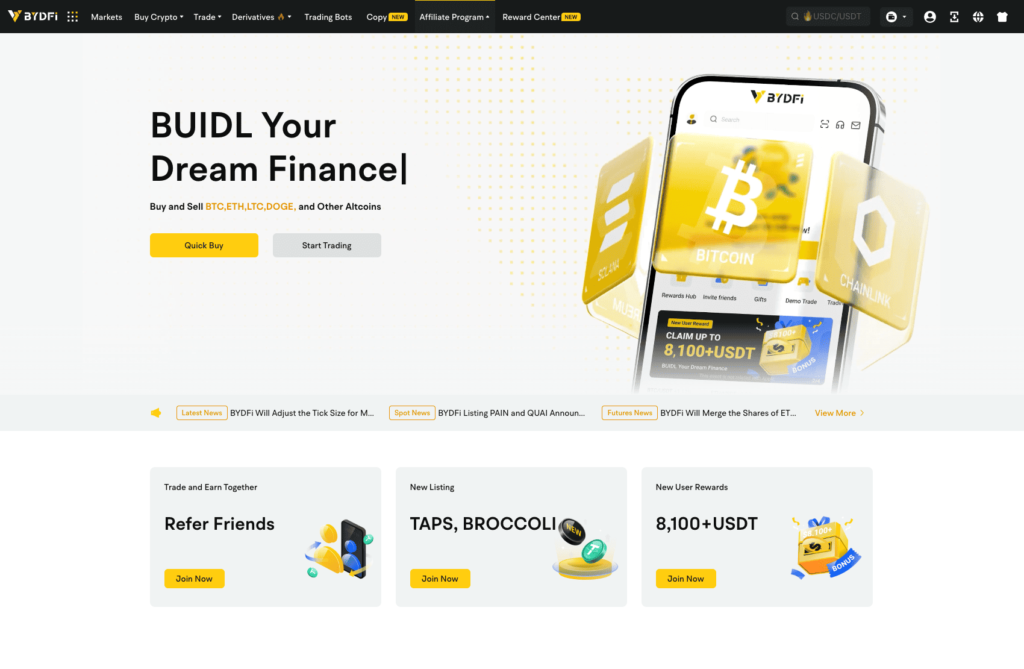
BYDFi tops our list as the best crypto contract trading platform, especially for traders in the USA as it is regulated in the US by FinCEN as a Money Service Business. This is a big deal in the crypto community and it’s one of the few platforms that offer contract crypto trading with no KYC to the US market, making it an excellent choice for both beginners and advanced traders looking for privacy, speed, and flexibility.
The first thing that stands out about BYDFi is the trading speed. Orders execute instantly, even under volatile conditions. It’s a good balance between beginner-friendly and advanced features, meaning new traders won’t feel lost, but there’s enough depth for experienced traders to optimize their leveraged crypto trading strategies. The interface is intuitive, yet fully customizable, allowing for precise order control, margin adjustments, and charting options.
For US traders who want a high-performance contract exchange, no KYC, and low fees of only 0.02%, BYDFi is one of the best choices available.
BYDFi contracts
BYDFi offers plenty of derivatives, such as:
- Perpetual Contracts (non-expiring, settled in USDT or crypto)
- Spot Market (Buy and sell crypto directly)
- Collateralized crypto contract
- Stablecoin-settled
- Copy Trading Contracts (Follow pro traders’ positions)
Key features
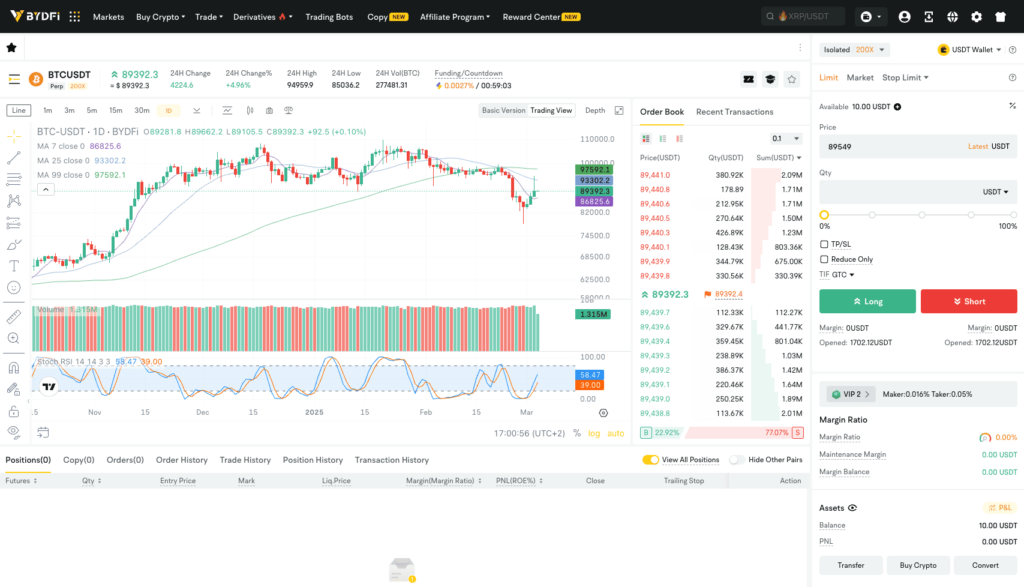
- Up to 200x margin on select contracts
- Isolated & Cross margin options
- Advanced order types: Limit, Market, Stop-Loss, Take-Profit, OCO
- Ultra-fast execution speed with minimal slippage
- No KYC required – trade with full privacy
- Multi-layered security protection (cold storage, two-factor authentication)
- Regulatory-friendly with licensing
- Customizable trading interface with TradingView integration
- Mobile app for iOS & Android
- Easy fiat on-ramp with multiple deposit options
- Low trading fees: Maker 0.02%, Taker 0.06%
- Transparent fee structure across long/short positions
Pros and cons
Pros
- Ultra-fast order execution with minimal slippage, even in volatile markets.
- Balanced rates—lower fluctuations compared to other contract platforms.
- Customizable collateral on open positions—adjust without closing trades.
- User-friendly interface with a clean design and intuitive order placement.
- 24/7 customer support via live chat, email, and Telegram.
- Positive user reviews highlight fast withdrawals and responsive support.
Cons
- No phone support
- Fewer copy traders that other platforms
- No fiat withdrawals
2. Phemex – Perpetual contract trading platform with lowest fees
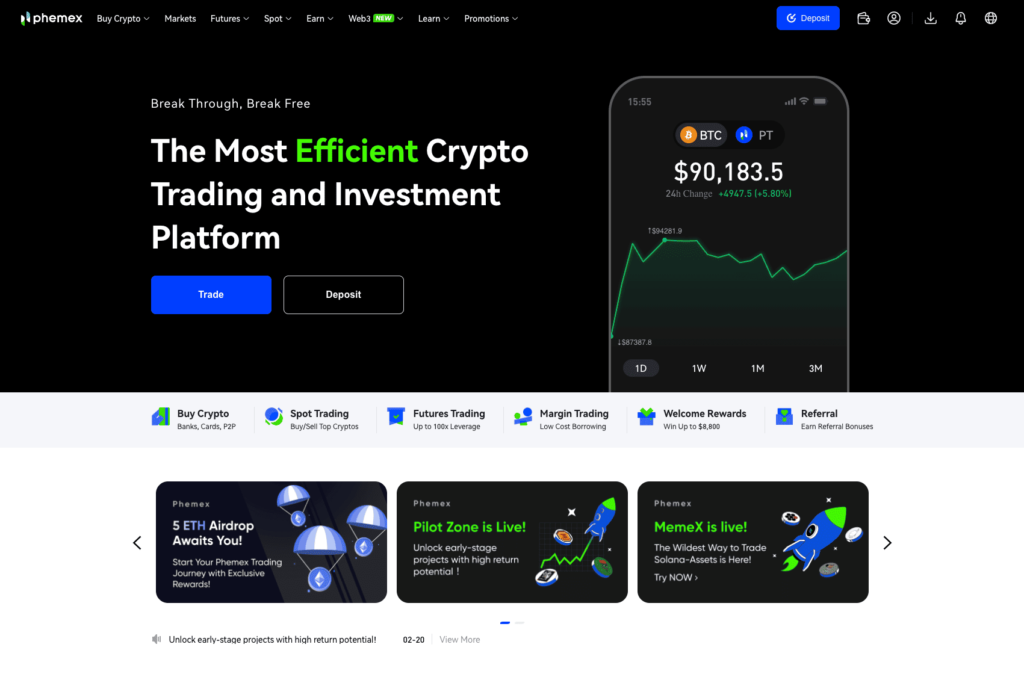
If you’re looking for the best crypto app for perpetual contract trading, Phemex is the obvious choice, offering a mix of high-frequency trading speed, risk management tools, and deep liquidity. The platform has recently opened the doors for the US market where they allow US traders to trade with or without KYC for more privacy. For serious traders, the mobile app execution speed and sub-millisecond matching engine make it an ideal choice.
I first tested Phemex by scalping ETH/USDT contracts, and what immediately stood out was how snappy the order execution felt. No lag, no slippage—just instant fills. The high-speed matching engine makes a huge difference when you’re trading short timeframes, and with zero-fee spot trading, I could hedge without extra costs. For traders who value efficiency, Phemex offers a clean, responsive UI and some of the best mobile integration options out there.
Phemex contracts
- Stablecoin-settled Contracts
- Collateralized crypto contract
- Derivatives Contracts
- Margin-Traded Contracts
- Copy Trading Contracts
- Spot Trading
- Pilot Contracts (Trading in High-Potential Coins)
Key features
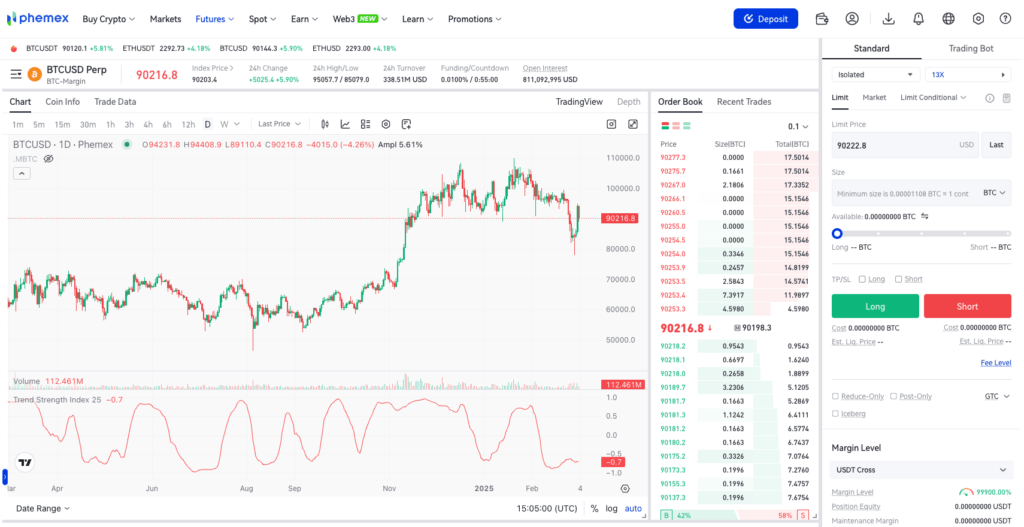
- Lightning-fast execution with 300,000 TPS
- Zero-fee spot trading (for premium users)
- Supports advanced order types (Post-Only, IOC, FOK)
- Up to 100x leverage on major contracts
- Sub-accounts with different margin allocations
- Low-latency trading
- Deep liquidity and minimal slippage
- Built-in risk management tools (trailing stops, TP/SL presets)
- Secure fund storage with cold wallet protection
Pros and cons
Pros
- No hidden fees or spread markups
- Stable performance during market surges
- Predictable fees for better planning
- Responsive customer support
Cons
- Premium membership required for trading fee discounts
- No fiat withdrawals
3. BTCC – Best crypto contract trading platform for US traders
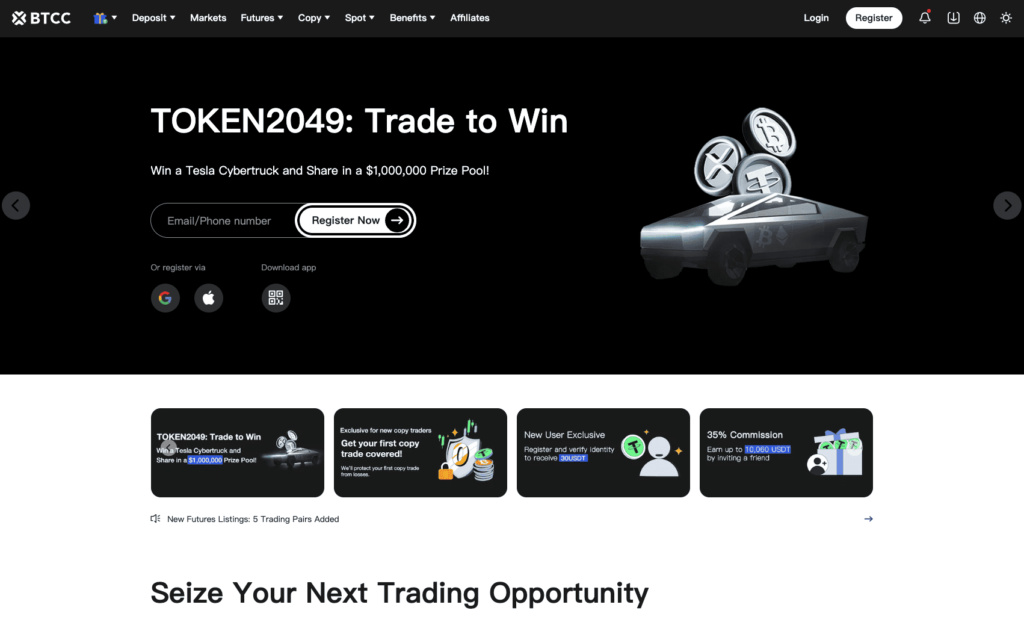
BTCC ranks as the best US crypto contract trading platform in our list of exchanges, offering top-notch liquidity, and it’s available for US traders. While many platforms limit access in the US, BTCC makes it easy to trade derivatives contracts with no KYC.
When I first tested BTC/USDT contracts, I was surprised by how smoothly my orders filled, even during fast market moves. Some exchanges struggle with slippage when volatility spikes, but BTCC handled it effortlessly. That alone makes a big difference when trading contracts as long as you are familiar with how it works as it increases the risks.
So, what makes BTCC stand out? 500x contract leverage, a fast execution engine, and transparent fees. It’s built for serious traders who want tight spreads, multiple contract types, and a user-friendly experience, all in a platform that works effortlessly on both desktop and mobile.
BTCC contracts
BTCC offers a diverse range of crypto trading products, including:
- Perpetual Contracts – No expiry, available for major crypto pairs
- Derivatives Contracts (USA) – Quarterly & monthly settlements
- Collateralized Crypto Contracts
- Stablecoin-settled – USDT-settled with easier profit/loss tracking
- Spot Trading – Direct crypto purchases
- Copy Trading – Follow and replicate top traders’ strategies
Key features
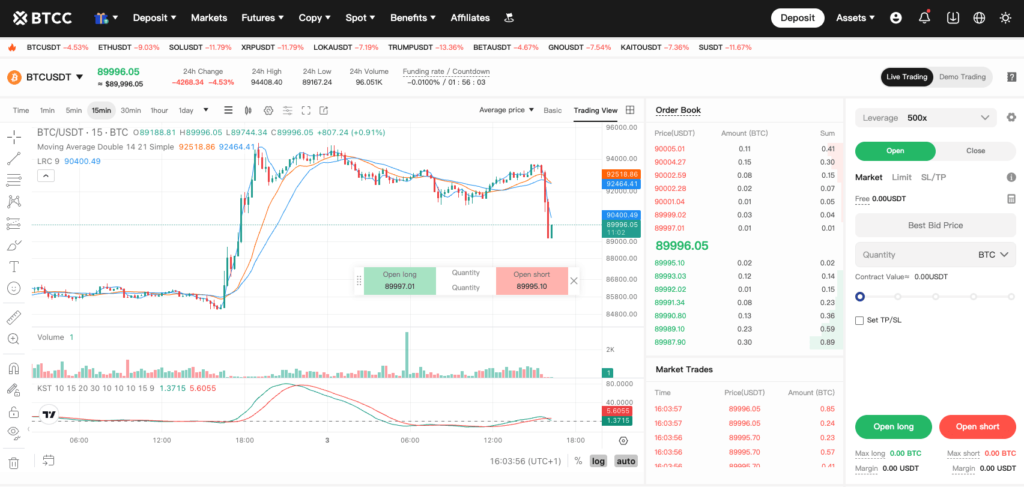
- Up to 500x contract leverage – Ideal for US crypto contract traders who want maximum exposure
- Deep liquidity – Ensures smooth order execution even in volatile markets
- Customizable margin settings – Choose between isolated and cross margin
- Multi-contract support – Trade perpetual, derivatives, and collateralized crypto contracts
- No KYC required – Trade without submitting personal documents
- Low minimum deposits – Start trading contracts with a small balance
- User-friendly interface – Easy for beginners, powerful for experienced traders
- Mobile trading app – Full-featured contract trading on the go
- Strong risk management tools – Reduce liquidation risk with stop-loss and take-profit orders
- Cold storage for user funds – Keeps assets secure from hacking risks
- Insurance fund protection – Helps cover losses and from forced liquidations
Pros and cons
Pros
- Stable fees – Less volatility in costs compared to other platforms
- No forced KYC pop-ups – US traders can trade freely without surprise account restrictions.
- Fast withdrawals – Crypto withdrawals process quickly without long reviews.
- Custom lot sizes – Fine-tune position sizing for better risk management.
- Better fees than Coinbase & Kraken – Lower trading costs, especially for high-frequency traders.
- US traders love it – A rare contract exchange that’s actually accessible without workarounds.
Cons
- Interface has a learning curve – Not the most beginner-friendly at first.
- High-risk – 500x contract leverage is powerful but can lead to fast liquidations.
- No staking or DeFi features – Strictly focused on trading, no passive income options.
4. Binance – Best second contract trading platform
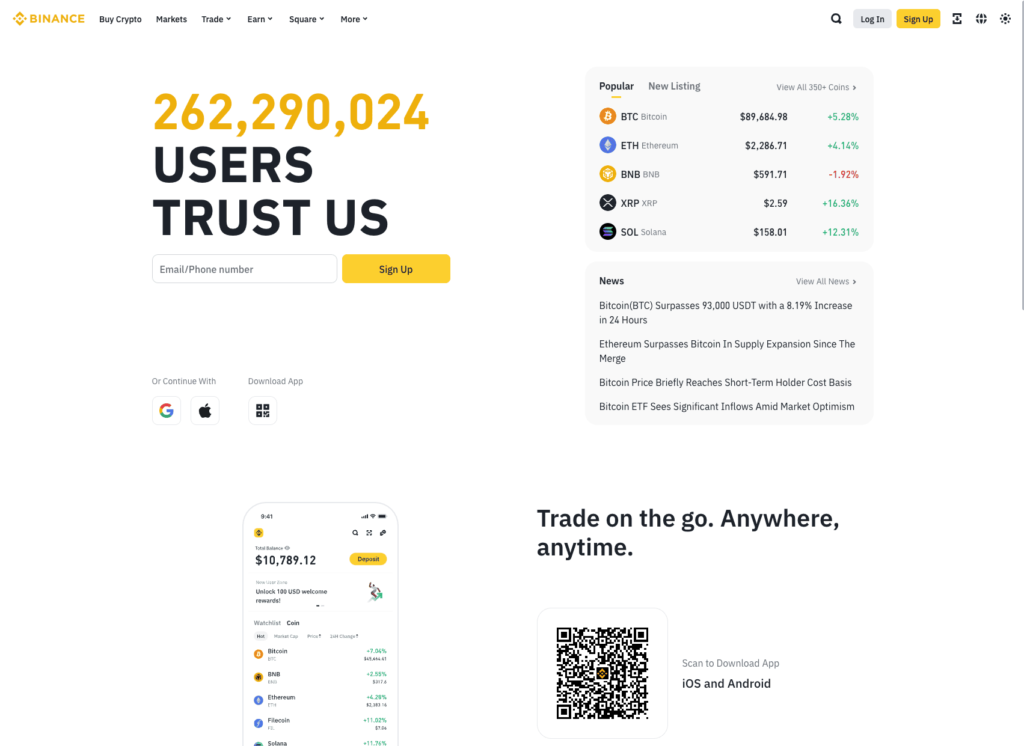
Binance is the best platform for second contract trading, offering ultra-fast execution on a 1-second level. Unlike many exchanges where delays or slippage can be an issue, Binance ensures that second contracts—where trades settle in just one second—are executed with precision.
If you’re looking for the best exchange for trading crypto options contracts, Binance is the top pick, making a difference among its competitors. It’s one of the few platforms where orders fill instantly, even in high volatility, and the options pricing actually makes sense, unlike some exchanges where spreads get ridiculous.
I remember testing a BTC/USDT options strategy ahead of a major market event. I set up a straddle, expecting volatility but unsure of direction. What stood out was how easy it was to track implied volatility, delta, and gamma. The execution was smooth, and even under heavy market movement, orders filled quickly. That’s something you don’t get on every platform.
Binance supports a range of options and contract types, making it a versatile choice for traders looking to hedge, speculate, or just test different strategies.
Binance contracts
- Options Contracts: BTC, ETH (European-style)
- Stablecoin-settled Contracts: BTC, ETH, BNB, SOL, XRP, ADA, DOGE, DOT, AVAX, and more
- Second Crypto Contracts: Trade Bitcoin and other cryptocurrencies with 1 second contracts.
- Collateralized Crypto Contracts: BTC, ETH, BNB, SOL, and others
- Crypto contracts: Time-based (e.g., 1-second or 3-month) and non-expiring perpetual contracts
- Margin Trading: Up to 10x margin on select pairs
- Spot Trading: 600+ cryptocurrencies with deep liquidity
- Copy Trading: Follow top traders and replicate strategies automatically
Key features
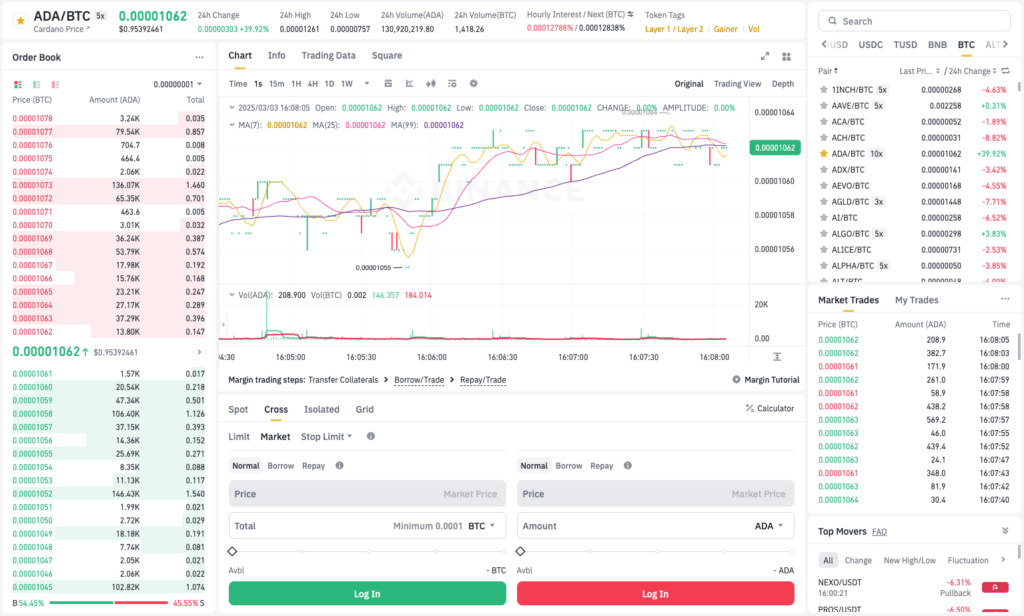
- Grid trading and TWAP (Time-Weighted Average Price) orders for algorithmic execution
- Auto-rebalance margin mode to prevent liquidation when using cross margin
- Multi-chart layout with TradingView integration for advanced technical analysis
- Post-Only, Reduce-Only, and Trigger Price orders for fine-tuned execution strategies
- Synthetic stablecoin trading pairs for better capital efficiency
- Options strategies builder with built-in P&L simulation and multi-leg execution
- Portfolio margin for professional traders, reducing capital requirements on hedged positions
- Copy trading functionality to follow expert traders with real-time position mirroring
- Institutional-grade security with SAFU fund, proof-of-reserves, and multi-tiered withdrawal protection
- Customizable liquidation alerts and auto-position close settings for better risk control
- 24/7 trading with great mobile, desktop, and API integration
Pros and cons
Pros
- Fast execution, even in high volatility – Orders fill quickly with minimal slippage.
- Deep liquidity – Enter and exit large trades without moving the market.
- Customizable colalteral – Switch between cross and isolated margin easily.
- All-in-one platform – Trade options, derivatives, spot, and even copy trade.
- BNB fee discounts – Lower trading fees add up over time.
- Great educational hub – Useful for learning advanced strategies.
Cons
- No derivatives for US traders – Binance isn’t available in the US.
- Interface can be overwhelming – Too many features for beginners.
- KYC required – Full access and higher withdrawal limits need verification.
- Costs and fees add up – Holding positions long-term can be costly.
- Occasional slowdowns – High volatility can cause system overloads.
5. PrimeXBT – Multi-asset contract trading platform
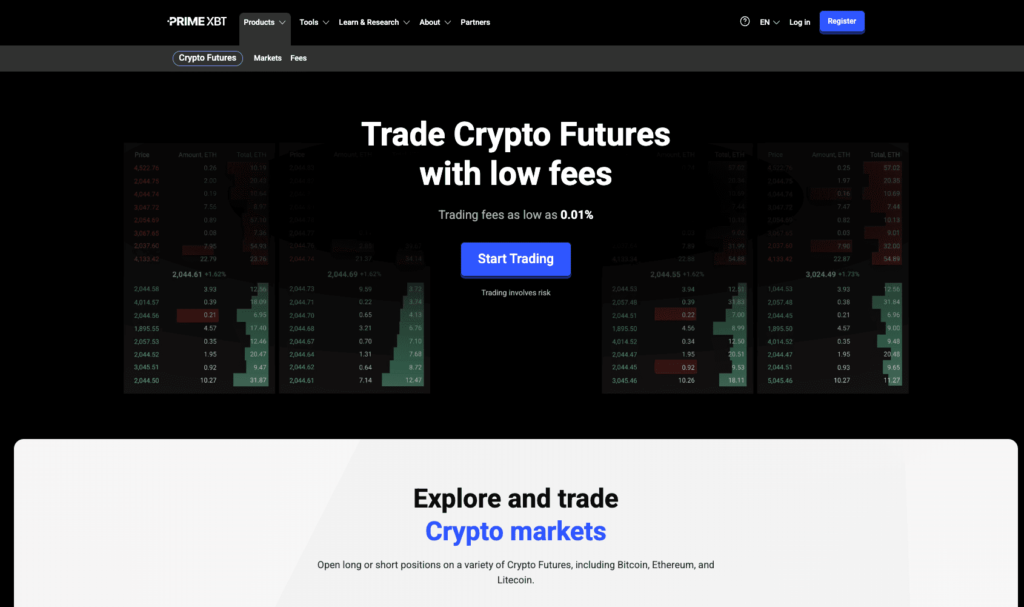
If you’re looking for a multi-asset contract trading platform, PrimeXBT is the best option. Most platforms stick to crypto, but PrimeXBT gives you access to forex, commodities, indices, and crypto contracts—all from a single account.
I remember testing it out when I wanted to short BTC/USD while simultaneously taking a long position on gold and the S&P 500. The ability to trade across multiple asset classes, without switching platforms, made a huge difference. The execution speed was impressive, and the multi-chart layout let me monitor everything at once.
To me, the platform also stands out for its contract markets, no KYC policy, and Covesting feature, which lets you follow pro traders’ strategies. If you want to trade beyond crypto while keeping your options open, PrimeXBT is worth considering.
PrimeXBT contracts
- Contracts: BTC/USD, ETH/USD, LTC/USD, XRP/USD, ADA/USD, BNB/USD
- FX & CFDs: EUR/USD, USD/JPY, GBP/USD, Gold, Oil, S&P 500, NASDAQ
- Copy Trading: Follow top-performing traders in the Covesting module
- Spot Trading: Buy Bitcoin and other cryptocurrencies with fiat money
Key features
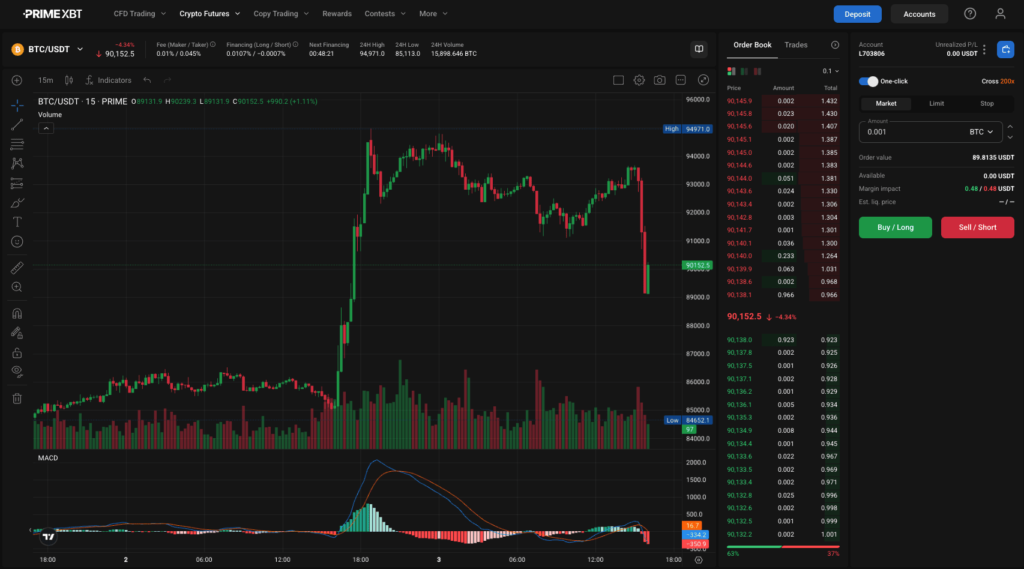
- No KYC means fast onboarding
- The trading engine is ultra-fast.
- Order execution is solid, even in high volatility, but slippage can happen on low-liquidity pairs.
- Covesting is a great way to copy pro traders.
- You can trade crypto, forex, and stocks side by side, which is rare for a contract-focused platform.
- The UI feels smooth, but mobile trading isn’t as polished as the desktop version.
- Fees are lower than Binance, which is a plus for overnight trades.
Pros and cons
Pros
- Trading across crypto, forex, and indices is seamless. No need for multiple accounts.
- Execution speed is fast, and orders rarely get stuck. Slippage is minimal on major pairs.
- No KYC means instant access, but you still get security features like 2FA.
- Covesting is useful if you pick the right traders, but it requires research.
- Low trading fees compared to Bybit and Binance.
Cons
- Not available in the USA, so traders need a VPN or an alternative platform.
- No direct fiat deposits, so you have to fund your account with crypto.
- No API access, making it less ideal for algo traders and bots.
- Mobile trading isn’t as smooth as the desktop version.
6. Bybit – Top crypto margin contract exchange
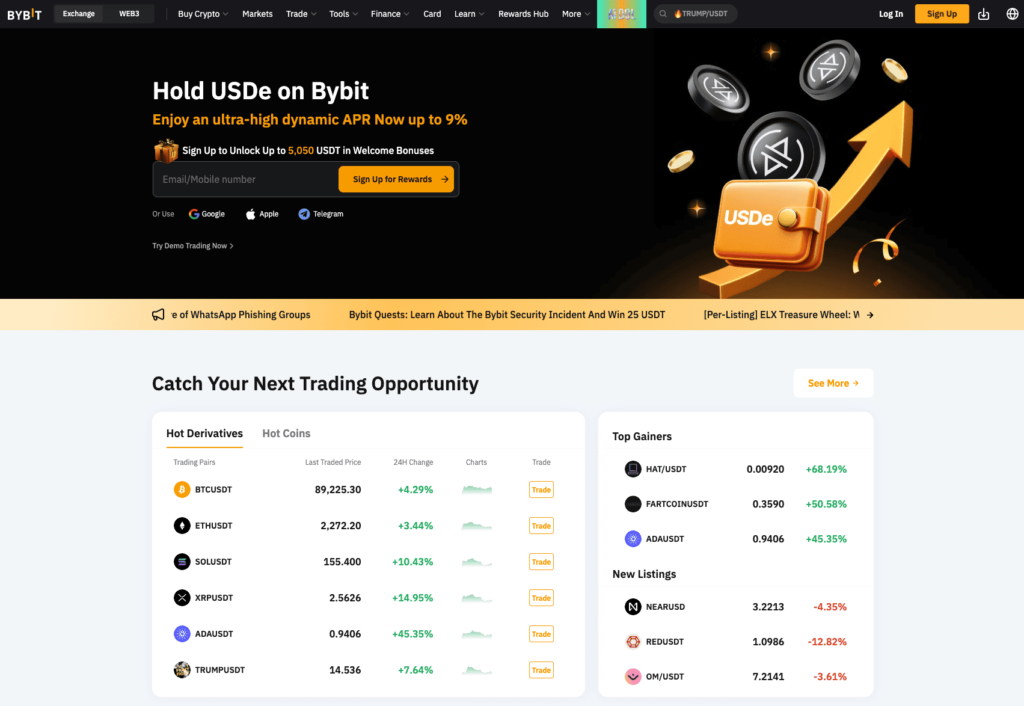
Bybit is the best margin contract exchange in this list, and it’s also a solid option for crypto options trading. I remember testing Bybit’s margin contracts for the first time, opening an ETH/USDT trade just before a major price breakout. The order executed instantly, and what stood out was the low slippage, deep liquidity, and intuitive risk controls.
If you’re serious about contract trading, Bybit has a lot to offer. It supports cross and isolated margin, advanced order types, and hedging mode, which allows you to hold long and short positions at the same time. For traders who rely on precision, the dual-price mechanism helps prevent unfair liquidations, and the AI-powered risk alerts keep positions in check. (If you think that you are close to getting liquidated, use our liquidation price calculator to double check and manager isks.)
Bybit contracts
- Perpetual contracts (Stablecoin-settled & collateralized crypto contract)
- Options contracts (USDC-margined)
- Crypto margin trading
Key features
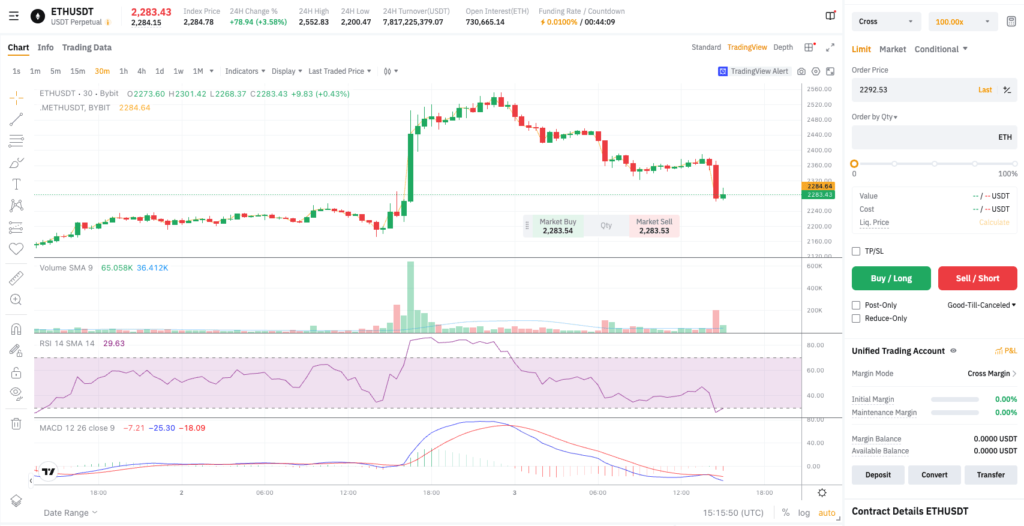
- Adjust collateral on active trades without closing the position
- Customizable order book depth with granular price levels
- View historical trade rates before entering a trade
- Dual-price liquidation system prevents unfair stop-outs
- Trigger orders execute cleanly, even in fast-moving markets
- Hedge mode toggles instantly without reopening positions
- Built-in position calculator to plan P&L before entering trades
- Trailing stop works without delay, even during high volatility
- Mobile app order entry is smooth, with no accidental taps
Pros and cons
Pros
- Zero-lag order execution, even during news events
- No artificial wicks—prices move in sync with top liquidity providers
- Withdrawals process within minutes, even without KYC
- Great depth on major pairs, reducing slippage on large orders
- Transparent fee structure for all markets
- One-click TP/SL adjustments while in an open trade
Cons
- Not available in the USA without a VPN
- KYC required for unlimited withdrawals
- Fee rates can spike during extreme volatility
- Options trading volume lower than Deribit
What is contract trading in crypto and how does it work?
Contract trading in crypto allows traders to speculate on the price of cryptocurrencies without owning the actual asset. Instead of buying and holding coins like Bitcoin or Ethereum, traders enter into contracts that track the price movement of these assets, hence the word, crypto contracts. This means you can go long (trade on price increases) or short (trade on price drops), making it possible to profit in both bullish and bearish markets.
One of the biggest advantages of contract trading is leverage. Exchanges offer multipliers like 10x, 50x, 200x or even 500x, allowing traders to control a much larger position with a smaller capital investment. But leverage is a double-edged sword—it amplifies both gains and losses.
Crypto contract trading comes in different forms, including perpetual contracts, derivatives contracts, collateralized crypto contracts, and options. Perpetual contracts don’t expire and are typically settled using dynamic fee mechanisms that keep their pricing aligned with the spot market, without needing fixed expiry dates like traditional options or CFDs. Crypto contracts have set expiration dates, while options provide flexible risk management strategies.
For traders who want to maximize their capital, hedge positions, or trade volatile price swings, contract trading is a must-know tool—but it requires proper experience to avoid liquidation.
Types of crypto contracts
Crypto contract trading comes in different formats but the most common types include:
- Non-expiry Contracts – These don’t have an expiration date, meaning traders can hold positions indefinitely.
- Derivatives Contracts – These are financial instruments whose value is derived from an underlying asset like cryptocurrencies, stocks, or commodities. Rather than owning the asset directly, traders speculate on its price movements. Derivatives enable strategies such as hedging risk or gaining exposure to markets without holding the asset itself. In crypto, common derivative forms include contracts that track price performance and settle based on predefined conditions.
- Options Contracts – Traders pay a premium for the right (but not obligation) to buy (call) or sell (put) an asset at a specific price. Ideal for risk management and strategic trades.
- Stablecoin-settled Derivatives – Also known as stablecoin-settled products, these are settled in USDT or other stablecoins, making crypto profit and loss calculations simpler and predictable.
- Collateralized crypto contracts – These xare settled in cryptocurrencies like BTC or ETH. These appeal to traders who want contract-based exposure while maintaining direct settlement in crypto, rather than stablecoins.
Who should use contract trading?
Contract trading isn’t for everyone, but it’s a powerful tool for those who understand leverage and risk management. It’s best suited for:
- Day traders & scalpers – Take advantage of short-term price movements with high leverage.
- Swing traders – Hold positions for days or weeks, benefiting from longer market trends.
- Hedgers – Protect spot holdings by shorting contracts to offset potential losses.
- Experienced traders – Those comfortable with risk management, stop-loss orders, and liquidation mechanics.
- Crypto holders (for collateralized crypto contracts) – Traders who want to grow their BTC or ETH holdings instead of using stablecoins for settlement.
Beginners should start with low ratios and practice on a demo account before trading with real capital.
What are the benefits and drawbacks?
Benefits
- Multiplies Profits – A small price move with contracts can yield massive gains.
- Shorting Lets You Profit in Bear Markets – No need to panic when prices drop—just short and make money.
- Instant Order Execution – No slippage, even in volatile markets.
- Advanced Order Types & Hedging – Use conditional orders, trailing stops, and hedge mode to manage risk.
- Hedge Your Spot Holdings – Protect your long-term crypto by shorting contracts.
- No Need to Hold Crypto – Trade without worrying about wallet security or exchange hacks.
Drawbacks
- Liquidations Happen Fast – Miscalculate your margin, and you’re wiped out. Use our leverage calculator to never make a mistake
- Fees Add Up – Holding positions overnight can eat into profits.
- Overconfidence Destroys Accounts – A few wins can lead to reckless trading.
- Emotional Trading Kills Profits – Closing winners too early, holding losers too long.
- Some Exchanges Manipulate Wicks – Bad platforms trigger stop-losses unfairly.
Can you trade crypto contracts in the USA?
Yes, you can trade crypto contracts in the USA by using a crypto platform such as BYDFi which adheres to the correct regulations and licenses from the CFTC and SEC such as the Money Service Business license.
In our guide, these platforms offer crypto contract trading for US traders:
- BYDFi – Supports perpetual and collateralized crypto contracts and no mandatory KYC.
- BTCC – One of the oldest crypto contract platforms and low trading fees.
- Phemex – A popular Stablecoin-settled perpetual exchange with fast execution.
Some traders use a VPN to bypass restrictions and trade on Bybit, Binance, and OKX, but this comes with risks:
- Accounts Can Be Banned – Exchanges track IPs and can freeze US traders’ funds.
- Withdrawal Issues – KYC might be required later, locking funds if you can’t verify.
- Against Exchange Terms – Even if successful, VPN trading violates platform policies.
A few traders create accounts while outside the US, but this method still carries risks.
For traders who prefer compliance, these US-regulated platforms offer crypto contracts:
- CME Group – Offers BTC & ETH contracts, but contracts require large capital and traditional brokerage access.
- Kraken – Provides crypto contracts, but access varies by state.
- Coinbase Advanced – Allows some derivatives trading, but only for institutional traders.
These platforms offer contract trading legally in the USA but lack high collateral and flexibility compared to offshore options.
How to pick the right platform: My checklist
With so many crypto contract trading platforms available, finding the right one can feel overwhelming. Some offer great mobile trading options, while others focus on low fees, deep liquidity, or no-KYC trading. The key is knowing what matters most for your trading style.
1. Margin Options
Margin can be a game-changer, but not all platforms offer the same flexibility. If you want 200x or 500x ratios, look at BYDFi or BTCC. If you prefer adjustable margin modes with both cross and isolated options, Bybit and Phemex might be better suited.
2. Trading Fees & Rates
Low trading fees matter, especially for high-frequency traders. Some exchanges offer near-zero maker fees, while others charge high rates that can drain your profits if you hold positions too long.
3. Contract Types
Different platforms specialize in different contract types. Stablecoin-settled derivatives (stablecoin-settled products) make P&L easy to track, while Collateralized Crypto Contracts are better if you want to settle trades in crypto instead of stablecoins. If you trade options, Bybit and Binance are solid choices.
4. Liquidity & Execution Speed
Ever had an order not fill fast enough, causing slippage? Deep liquidity means tight spreads and instant execution—a must for serious traders. Bybit and Binance lead in liquidity, while smaller platforms may struggle during high volatility.
5. No-KYC vs. Regulated Platforms
If you want to trade without ID verification, BYDFi, BTCC, and Phemex allow no-KYC withdrawals up to a limit. For full compliance, CME Group and Kraken offer regulated contracts, but with lower leverage and stricter requirements.
6. Mobile Trading & User Experience
Some platforms are built for desktop, while others have fast, stable mobile apps for trading on the go. If you need multi-chart layouts, custom order books, or one-click TP/SL adjustments, check if the platform supports them before committing.
7. Deposit & Withdrawal Methods
Some traders need fiat on-ramps, while others are fine with crypto-only deposits. If you want to fund your account with a credit card or bank transfer, check which platforms support it—many no-KYC exchanges are crypto-only.
How we reviewed and tested the platforms
When it comes to contract trading, the small details matter. A platform might look great on paper, but if orders slip, costs and rates eat your profits, or withdrawals take forever, it’s useless. That’s why I personally tested each platform by trading real contracts, checking fees, and pushing the system to see where it holds up—and where it breaks down.
1. Live Trading Experience
I didn’t just skim the features—I placed real trades to see how execution felt. Market orders should fill instantly, and limit orders should execute at the expected price, not get front-run by hidden spreads. Some platforms claim deep liquidity, but when you actually trade, you see whether that’s true or just marketing fluff.
2. Fee Analysis
Trading fees are one thing, but fees can quietly drain your profits if you’re not paying attention. I checked how much each platform charges for long vs. short positions, whether fees spikes unpredictably, and whether hidden fees pop up in withdrawals.
3. Leverage & Risk Management
I tested how easy it was to adjust leverage on open positions, switch between cross and isolated margin, and set up trailing stop-loss orders. Some platforms make risk management smooth, while others force you to close and reopen trades just to tweak leverage—a frustrating (and unnecessary) design flaw.
4. Liquidity & Order Book Depth
There’s nothing worse than placing a trade, only to see the price jump against you because of thin liquidity. I watched how the order book reacted during high volatility and tested slippage on large market orders. Some platforms hold steady, while others widen the spread when things get wild.
5. Security & Trust
If I’m going to deposit funds on a platform, I need to know my money is safe. I checked whether exchanges use cold storage, insurance funds, and two-factor authentication. If an exchange has a history of withdrawal issues or dodgy price wicks, I dug deeper into trader complaints.
6. User Experience & Mobile Trading
I trade on both desktop and mobile, so I tested how well the mobile apps handle placing quick orders, adjusting leverage, and closing trades. Some platforms make mobile trading effortless, while others feel clunky and slow when it matters most.
7. Customer Support & Real Trader Feedback
I also tested customer support response times by submitting real tickets and checking how they handle issues. I scrolled through trader forums and Telegram groups to see what real users were saying—because if an exchange has withdrawal delays or suspicious liquidations, traders talk about it.
FAQ
Yes, contract trading is a legitimate way to trade crypto with leverage, offered by most major exchanges. However, it comes with risks, so choosing a reliable platform is essential.
It can be very profitable is you are experienced with how contracts works, but profits depend on market conditions, strategy, and risk management. Leverage amplifies gains and losses, so it’s not for everyone.
Yes, it is, as long as you trade on a regulated platform. Some platforms allow crypto contract trading in the USA, but others restrict access due to regulations. Non-KYC exchanges are an option for traders who prefer privacy.
Exchanges like BYDFi, BTCC, and Phemex offer contract trading, no KYC, and are accessible for US traders looking to trade contracts.
The biggest risks include liquidation, price volatility, fees, and exchange security issues. Without proper risk management, losses can exceed your initial investment.
Conclusion
Picking the right crypto contract trading platform isn’t just about finding the one with the best interface or lowest fees—it’s about what works best for you. Some traders want no KYC and full privacy, while others prioritize deep liquidity and advanced tools.
For US traders, BYDFi and BTCC are the best perpetual contract trading platforms, offering no KYC, and smooth execution. If mobile trading is a priority, Phemex delivers a seamless experience. Binance remains the top choice for options trading and second Bitcoin contract trading, with a wide range of contracts and strong liquidity.
At the end of the day, contracts can be a powerful tool—but only if you know how to use it. Contract trading opens the door to profiting in any market condition, but it also comes with risks. Choosing the right exchange is the first step—trading smart is the next.
Want to find the best platform for your strategy? Dive into the full guide and see which one fits your style.
If you are just looking for more options, I recommend reading our guide about crypto margin trading exchanges and 200x leverage crypto exchanges.


